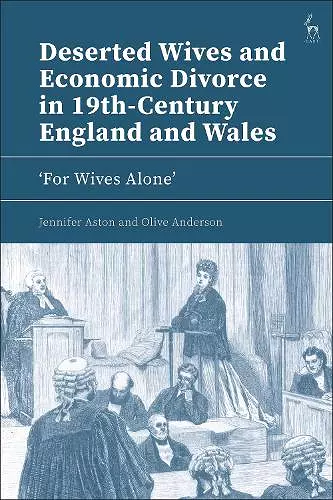Deserted Wives and Economic Divorce in 19th-Century England and Wales
‘For Wives Alone’
Jennifer Aston author Olive Anderson author
Format:Hardback
Publisher:Bloomsbury Publishing PLC
Published:14th Nov '24
Currently unavailable, and unfortunately no date known when it will be back

Examines the Divorce and Matrimonial Causes Acts and their use by married women to reclaim voting rights and rights of testation, inheritance and property ownership.
This book considers Section 21 of the Divorce and Matrimonial Causes Act 1857 and its significant impact on previously invisible married women in the 19th century.
Tens of thousands of women used this little-known section of the Act to apply for orders from local magistrates' courts to reclaim their rights of testation, inheritance, property ownership, and (dependent on local franchise qualifications) ability to vote. By examining the orders that were made and considering the women who applied for them, the book challenges the mistaken belief that Victorian England and Wales were nations of married, cohabiting couples.
The detailed statistical analysis and rich case studies presented here provide a totally new perspective on the legal status and experiences of married women in England and Wales. Although many thousands of orders were granted between 1858 and 1900, their details remain unknown and unexamined, primarily because census records did not consistently record dissolved marriages and there is no central index of applications made.
Using sources including court records, parliamentary papers, newspaper reports, census returns, probate records and trade directories, this book reconstructs the successful – and unsuccessful – experiences of women applying to magistrates’ courts and the Court for Divorce and Matrimonial Causes to protect their assets across regions and decades.
Building on Olive Anderson’s pioneering work, Jennifer Aston has produced a brilliant modern analysis of a little known but vitally important section in England’s first divorce law – a significant contribution to women’s legal history. * Professor Rosemary Auchmuty, Professor of Law, Reading University, UK *
This fascinating exploration of a little-known provision provides an important new perspective on law-making, legal officeholders, and the protection accorded to women as economic actors in mid-Victorian England. * Professor Rebecca Probert, Professor of Law, Exeter University, UK *
This groundbreaking work is a major contribution to legal and social history and has much to offer anyone interested in the history of married women’s property rights. For the first time, the significance of a now obsolete legal provision is brought to the fore, skillfully and powerfully revealing the forgotten stories of how so many shed the oppressive chains of coverture, while challenging long-standing assumptions about the economic and legal status of Victorian deserted wives. * Professor Sharon Thompson, Reader in Law, Cardiff University, UK *
This fine book represents an unusual collaboration between two historians who never met and worked decades apart with different source materials and methodologies. Its origins lie in Jennifer Aston’s hunch that the section 21 provisions of the Divorce and Matrimonial Clauses Act of 1857 had been misinterpreted in studies of property law in relation to married women, with misleading consequences for understanding their importance in ensuring women’s ability to act as autonomous economic agents, particularly as owners and managers of business enterprises. Aston’s research brought up the work of Olive Anderson, a legal historian who shared Aston’s insight, and had been working on this topic when she died. With the enthusiastic support of Anderson’s daughters, anxious to see their mother’s work brought to light, Aston edited and completed the manuscript, combining the original with her own wonderful blend of micro history and political economy. Section 21 orders were indeed more important than hitherto understood. Available much more easily and cheaply than divorce, they protected any property that wives acquired after desertion from husbands’ depredations, so providing a kind of ‘economic divorce’ with empowering consequences. Olive Anderson would surely have been grateful to see her unfinished work refreshed, extended, enlivened, and made available to a new generation of historians, gratitude that should be shared by the many gender scholars able to benefit from this important contribution. * Professor Jane Humphries, Centennial Professor of Economic History at the London School of Economics and a Fellow of All Souls College, University of Oxford, UK *
ISBN: 9781509970605
Dimensions: unknown
Weight: unknown
288 pages